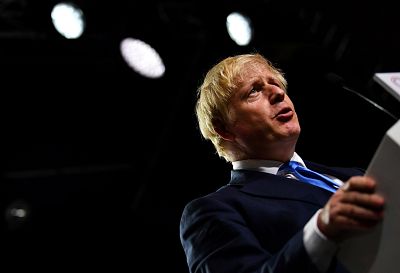Opponents see this as an extraordinary attempt by Boris Johnson to make it harder for lawmakers to thwart plans for Brexit.
LONDON — The British government was accused of bringing the country to the brink of a constitutional crisis Wednesday after widespread reports that Prime Minister Boris Johnson is preparing to ask Queen Elizabeth II to suspend Parliament.
News that Johnson was set to ask the queen to suspend Parliament from early September until mid-October was widely reported in U.K. media, which cited anonymous government sources. NBC News reached out to Johnson's government, which declined to give a statement.
The BBC reported that Johnson will use the Queen's Speech — normally a formality that outlines the legislative agenda — to make the move.
The pound plunged on the news, down to $1.2196 from almost $1.2300 the previous day.
Opponents see this as an extraordinary attempt by the prime minister to make it harder for lawmakers who want to thwart the prime minister's plans for Brexit, as the deadline for Britain to leave the European Union looms on October 31.
Opposition Labour Party lawmaker Ben Bradshaw called the move "a coup, plain and simple, against our parliamentary democracy." He warned it would "drag the monarch into an unprecedented constitutional crisis."
Nicola Sturgeon, the leader of the Scottish Parliament, said that "today will go down in history as a dark one indeed for U.K. democracy" if Johnson went through with the move.
NBC News reached out to Johnson's government, which declined to give a statement. Many U.K. political journalists, including those at the BBC and Sky, cited government sources saying the prime minister was set to ask the queen to suspend Parliament from early September until mid-October.
Some observers see this as an attempt by the prime minister to make it harder for lawmakers to thwart his Brexit plans.
Next week was already set for a showdown between the prime minister and the House of Commons, which is currently on recess. Suspending Parliament would reduce the amount of working days before Oct. 31, the deadline when Britain is official set to exit the E.U.
The major dispute has arisen because Johnson says if he cannot negotiate a deal with the E.U. by this date, he would be prepared to leave Europe without a deal at all.
Many lawmakers from his own Conservative Party and all opposition parties want to stop this "no-deal Brexit" scenario at all costs. Many experts, business leaders and even the government's own leaked assessment warn this "no-deal Brexit" scenario could trigger economic pain and even a shortage of food and medicine.
The Institute for Government think tank says that suspending Parliament in this way, officially known as "proroguing Parliament" would be "undemocratic" and "a deeply troubling precedent to set."
In a general briefing paper on the subject, it added, "Asking the queen to give effect to this strategy would draw her into a massive political debate — something which Number 10 and the Palace are normally at great pains to avoid."
Opposition Labour Party lawmaker David Lammy called for people to "take to the streets in peaceful protest and civil disobedience." He called Johnson "poundshop dictator" — using the British term for a dollar store — and accused him of threatening "to end Britain's long history of parliamentary democracy."
For months, Johnson has refused to rule out the move, drawing condemnation from across the political spectrum.John Major, the former British prime minister of Johnson's own Conservative Party, likened the move to Charles I, the king who prorogued Parliament in the 17th century in a move that led to his beheading in 1649.
"It didn't end well for him" and "shouldn't end well" for Johnson either, Major told the BBC in July.












